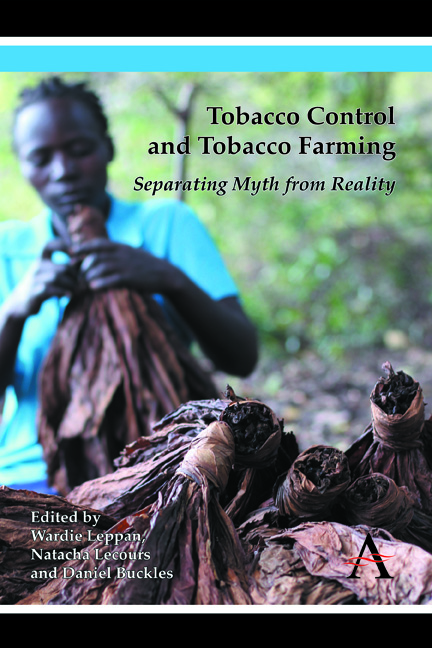Book contents
- Frontmatter
- Contents
- List of Figures, Tables and Photographs
- Foreword
- Preface
- Introduction: Separating Myth from Reality
- Section One The Determinants of Tobacco Leaf Demand
- Chapter 1 Determinants and Likely Evolution of Global Tobacco Leaf Demand
- Chapter 2 Tobacco Leaf Farming in Lebanon: Why Marginalized Farmers Need a Better Option
- Chapter 3 “Gentlemen, Why Not Suppress the Prices?”: Global Leaf Demand and Rural Livelihoods in Malawi
- Section Two Tobacco-Farming Conditions in Low- and Middle-Income Countries
- Section Three Economically Sustainable Alternatives to Tobacco
- Conclusion: Reframing the Debate on Tobacco Control and Tobacco Farming
- Annex: A Policy Brief on Tobacco Control and Tobacco Farming
- Contributors
Chapter 1 - Determinants and Likely Evolution of Global Tobacco Leaf Demand
from Section One - The Determinants of Tobacco Leaf Demand
Published online by Cambridge University Press: 05 November 2014
- Frontmatter
- Contents
- List of Figures, Tables and Photographs
- Foreword
- Preface
- Introduction: Separating Myth from Reality
- Section One The Determinants of Tobacco Leaf Demand
- Chapter 1 Determinants and Likely Evolution of Global Tobacco Leaf Demand
- Chapter 2 Tobacco Leaf Farming in Lebanon: Why Marginalized Farmers Need a Better Option
- Chapter 3 “Gentlemen, Why Not Suppress the Prices?”: Global Leaf Demand and Rural Livelihoods in Malawi
- Section Two Tobacco-Farming Conditions in Low- and Middle-Income Countries
- Section Three Economically Sustainable Alternatives to Tobacco
- Conclusion: Reframing the Debate on Tobacco Control and Tobacco Farming
- Annex: A Policy Brief on Tobacco Control and Tobacco Farming
- Contributors
Summary
Introduction
Tobacco industry advocates argue that tobacco-control policies are the chief culprits in reducing global tobacco leaf demand, thus negatively affecting farmers' livelihoods. The argument runs as follows: tobacco-control policies lead to a decrease in tobacco consumption and therefore to a decline in global demand for tobacco leaf. This will impoverish large numbers of farmers in poorer countries that heavily rely on tobacco leaf farming.
This chapter examines trends in the global tobacco leaf market, key features of the tobacco industry and a range of factors driving global tobacco leaf demand. It shows that tobacco-control policies play a very minor role in determining short- to medium-term global demand for tobacco leaf. Population growth, income growth, cultural norms, new technology, national economic and political dynamics, government subsidies and the corporate strategies of a monopolistic industry carry much more weight in driving demand for and production of tobacco globally and in particular national contexts. By placing global tobacco leaf demand in this broader perspective, the fallacy of the industry argument against tobacco-control policies is revealed. It also highlights the real source of vulnerability of tobacco farmers to fluctuations in demand and falling farm-gate prices for tobacco leaf – their weak position in the leaf marketing chain.
- Type
- Chapter
- Information
- Tobacco Control and Tobacco FarmingSeparating Myth from Reality, pp. 13 - 28Publisher: Anthem PressPrint publication year: 2014

